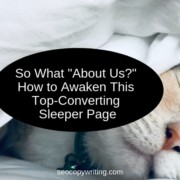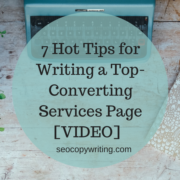How to make readers do (and buy) what you want
 Most writing is persuasion, be it promoting a product or convincing a reader to turn the page.
Most writing is persuasion, be it promoting a product or convincing a reader to turn the page.
Authors seek to persuade readers to reach a story’s conclusion. They do this with compelling characters, an entertaining plot and accessible themes.
But in marketing, the “conclusion” is typically some type of conversion: an email sign-up, a social media interaction, a sale.
How do we do that? How do we break through the cacophony of sales pitches, banner ads, product placements, billboards and the like to land our product or service front and center?
With good writing. Writing macro enough to maintain branding, specific enough to achieve an objective and malleable enough to adjust to the wants and needs of various consumers.
Persuasive Techniques
Winning an argument is usually the result of one thing: the superior persuasive ability of one of the parties. A good point in the hands of a bad debater is often lost, and the reverse is also true. Therefore, in many cases, being “right” is irrelevant.
However, to understand how to use copy to persuade readers, there are a number of tools effective writers employ.
- Tone and Voice
Knowing one’s audience is essential when crafting an advantageous marketing message. Depending on customer demographics and the desired action or outcome, good writers modify their tone and voice to better appeal to the core audience of their product or service. Copywriters need to know when to finesse, when to order, when to guilt, when to ask, when to beg, when to dare. Your readers are real people – you just can’t see them.
- The Personal Story
The personal story can be a powerful method of influencing action, which is why many marketers turn to testimonials. Personal stories draw readers in, investing them mentally and emotionally, forming a bond between product / service and story. Think of the Olympics: a Russian gymnast who falls off the balance beam is sad; but a Russian gymnast who’s just told us her story of hardship, loss and attending 4 a.m. practices for a decade – her fall is devastating.
- Passivity vs. Persistence
A big part of being persuasive is recognizing the time to push and the time to hold back. Considering when (and whether) to press an angle is vital for a copywriter. Marketers should be very conscious of the passivity-persistence continuum when crafting a message. In a worst case scenario, a misstep with a particular piece of content can translate to a dislike of the brand in general. Humor, however, is a great method of diffusing a reader’s annoyance with your persistence.
- Selling the Dream
A tried and true method of influence is aspiration – convincing targets that your product or service is the answer to their wants, needs and dreams by showing someone who has the life they want. Subtext is everything here (drink Miller Lite and you’ll be popular, buy your kids Sunny D and they’ll love you). Aspiration is one of the main reasons celebrity endorsements are so powerful; by using the same product or service, a consumer puts himself in the celebrity’s league.
- Appeal to the Collective Unconscious
There are a number of things the vast majority of us culturally agree upon: Mom, apple pie, puppies, freedom, the hotness of Brad Pitt, baseball, sliced bread, Elvis, warm socks, heavy duty aluminum foil, Jiffy Pop. By citing some of these “truisms” in copy, writers are able to tether their product / service to these mores, convincing consumers that to be against a particular product or service is to be against one of the aforementioned.
- The Call-to-Action
But all of your persuasive, inspired copywriting is for naught if, at the end of the day, you aren’t shooting for a conversion. This conversion can be anything from posting a blog comment to selling a Leer jet. You have to tell the reader what you want. You have to define the goal.
You have to call on them to ACT.
What Makes a Good Call-to-Action?
A good call-to-action must be specific, achievable and measurable. It must accomplish the desired conversion. And, finally, it must be singular – multiple calls-to-action leave the reader confused and overwhelmed.
If you integrate the aforementioned suggestions into your copywriting, you can expect a surge in reader interest and interaction. And while not every target will convert, your odds improve exponentially when you keep these persuasive techniques in mind.
 About the Author ~ Katie Fetting-Schlerf
About the Author ~ Katie Fetting-Schlerf
Katie Fetting-Schlerf is a writer — SEO copy, screenplays, angry letters to the editor and greeting cards. She is a senior copywriter at Portent, Inc., a full service web marketing company based in Seattle (where she regularly drives her co-workers nutty with various marketing diatribes). You can follow Katie on Twitter (@KatieLFetting), but she rarely tweets. When she does, it’s usually either about brand equity or serial killers.
Photo/image thanks to The UMF (Paul Inkles)
Is Web writing and blogging one of those tasks that you’d rather outsource? Cool. We can help: Learn more about our SEO copywriting services (and check out our case studies while you’re there. We’ve done some awesome things for clients!)







Fantastic article Katie. I really like what you wrote about knowing your audience. Very true. Thank you so much for this great information.